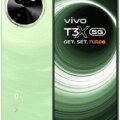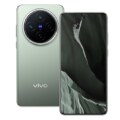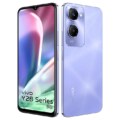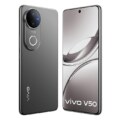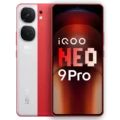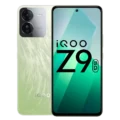- All Products
- Mobiles
- Vivo T3 Ultra
Vivo T3 Ultra






-
CPU
Mediatek Dimensity 9200+, Octa-core -
RAM
8GB / 12GB -
Storage
128GB / 256GB -
Display
6.78 inches, AMOLED -
Camera
Rear- Dual: 50MP, 8MP / Front: 50MP -
OS
Android 14, Funtouch 14
Vivo T3 Ultra: A Flagship Device Designed for Performance and Photography
The Vivo T3 Ultra has quickly emerged as one of the most sought-after smartphones in the market. With its blend of powerful performance, stunning photography capabilities, and sleek design, it offers everything you need in a flagship device. From the MediaTek Dimensity 9200+ chipset to the 50 MP Sony IMX921 OIS camera, the Vivo T3 Ultra is designed to deliver an exceptional user experience in every aspect. Let’s dive into the key features that make this phone a standout choice for tech enthusiasts and casual users alike.
Vivo T3 Ultra: Powered by MediaTek Dimensity 9200+ Chipset
At the heart of the Vivo T3 Ultra lies the powerful MediaTek Dimensity 9200+ chipset, featuring over 17 billion transistors and advanced APU Fusion technology. This powerhouse chipset ensures that the Vivo T3 Ultra offers top-tier performance, whether you’re gaming, multitasking, or streaming. It’s like driving a supercar with a V10 engine—delivering exceptional speed, power, and efficiency. With an Antutu score of 1,600K+, this phone provides an unparalleled experience in speed and responsiveness, ensuring it can handle even the most demanding tasks with ease.
Vivo T3 Ultra: Pro-Level Photography with 50 MP Sony IMX921 OIS Camera
The Vivo T3 Ultra takes mobile photography to the next level with its 50 MP Sony IMX921 OIS rear camera. Featuring a large 1/1.56-inch sensor and an f/1.88 aperture, this camera excels in capturing detailed and vibrant photos, even in low light. The optical image stabilization (OIS) reduces the blur caused by hand movement, ensuring sharper and clearer images. Additionally, the increased light intake—by 2.8 times—means that low-light photos are still rich in detail and clarity. Whether you’re capturing stunning sunsets or quick snapshots, the Vivo T3 Ultra guarantees professional-quality photos every time.
Vivo T3 Ultra: IP68 Dust and Water Resistance for Enhanced Durability
The Vivo T3 Ultra is built to withstand the rigors of daily life. With its IP68 dust and water resistance rating, this phone is protected against dust and can be submerged in up to 1.5 meters of water for up to 30 minutes. Whether you’re caught in the rain or taking your phone to the beach, the Vivo T3 Ultra can handle it all, providing durability and peace of mind no matter where you go.
Vivo T3 Ultra: 1.5K AMOLED Display with 120Hz Refresh Rate
One of the standout features of the Vivo T3 Ultra is its stunning 1.5K AMOLED display. Measuring 17.22 cm (6.7 inches) and featuring a 120Hz refresh rate, this display offers a smooth, fluid user experience that makes scrolling, gaming, and media consumption a joy. With a resolution of 452 PPI, the screen delivers sharp, vibrant, and detailed visuals. The 3D curved edges further enhance the immersive experience, while the peak brightness of 4500 nits ensures that your content remains clear even under direct sunlight. The display is designed to provide a high level of comfort, offering features like AI Eye Protection and 2160Hz PWM dimming to reduce eye strain and adjust the screen brightness based on your environment.
Vivo T3 Ultra: 50 MP AF Group Selfie Camera for Perfect Selfies
Selfie lovers will appreciate the Vivo T3 Ultra’s 50 MP AF (autofocus) group selfie camera. With a 92° ultra-wide-angle lens, this camera ensures that everyone fits in the frame, whether you’re snapping a group selfie or taking a solo shot. Advanced AI enhancements further improve the clarity and vibrancy of your selfies, ensuring that your photos look great day or night. Whether you’re at a party or in a scenic location, the Vivo T3 Ultra makes it easy to capture stunning selfies that you’ll be proud to share.
Vivo T3 Ultra: 5500 mAh Battery for All-Day Usage
The Vivo T3 Ultra is equipped with a massive 5500 mAh battery that ensures you stay powered throughout the day. Whether you’re working, gaming, or streaming your favorite shows, this phone can handle it all without constantly needing a recharge. The impressive battery capacity provides longer usage times, so you don’t have to worry about running out of battery during your busy day. With the Vivo T3 Ultra, you can stay connected and productive for hours on end.
Vivo T3 Ultra: 80W FlashCharge for Quick Power-ups
When it’s time to recharge, the Vivo T3 Ultra offers blazing-fast 80W FlashCharge technology, powering the phone from 0% to 100% in just 56 minutes. With Zero-power Superfast Startup, your phone powers up in just 3 seconds from zero battery, ensuring that you’re always ready to go. Whether you’re in a rush or simply need a quick top-up, the Vivo T3 Ultra ensures that you never have to wait long to get back to using your device.
Vivo T3 Ultra: 4K HD Ultra Stable Video Recording
Video recording is another area where the Vivo T3 Ultra shines. Both the front and rear cameras support 4K video recording at 60 FPS, delivering stunningly clear and smooth footage. Whether you’re recording a vlog, capturing a family moment, or making a high-res video call, the Vivo T3 Ultra ensures that your videos look professional-grade. With the added benefit of ultra-stable video, you can capture smooth, shake-free footage, even in motion, making it ideal for content creators and casual users alike.
Vivo T3 Ultra: AI Erase for Easy Photo Editing
With the Vivo T3 Ultra, photo editing becomes easier than ever thanks to the AI Erase feature. This powerful tool allows you to remove unwanted elements from your photos, such as passersby or obstacles, with just a few taps. Simply circle or smudge the unwanted object, and the AI will automatically erase it, leaving the rest of the photo intact. Whether you’re enhancing your vacation photos or cleaning up a quick snapshot, the AI Erase feature makes photo editing fast and efficient.
Vivo T3 Ultra: AI Photo Enhance for Automatic Image Optimization
The Vivo T3 Ultra also comes with the AI Photo Enhance feature, which automatically optimizes and enhances your photos. Using advanced AI algorithms, this feature adjusts lighting, contrast, and color to ensure your photos always look their best. Whether you’re shooting in challenging lighting conditions or trying to improve an old, blurry photo, AI Photo Enhance ensures that your images are clear, vibrant, and stunning.
Vivo T3 Ultra: Studio-Quality Aura Light for Perfect Portraits
For perfect portrait shots, the Vivo T3 Ultra includes a studio-quality Aura Light feature. This light uses a nanoscale guide that is nine times larger and 45 times softer than typical flashes, providing natural and even lighting for your photos. Whether you’re taking selfies or capturing group photos, the Aura Light ensures your portraits are illuminated perfectly, giving your shots a professional, polished look.
Conclusion
The Vivo T3 Ultra is a smartphone that truly excels in every aspect. From its powerful MediaTek Dimensity 9200+ chipset to its impressive 50 MP Sony IMX921 OIS rear camera, this phone is designed to provide top-tier performance, photography, and video capabilities. With features like a 1.5K AMOLED display, 5500 mAh battery, and 80W FlashCharge, the Vivo T3 Ultra offers a seamless and enjoyable user experience. Whether you’re a photographer, content creator, or tech enthusiast, the Vivo T3 Ultra is sure to meet all your needs and exceed your expectations.
Specs
General
| Device Type | Smart Phone |
| Model | Vivo T3 Ultra |
| Announced | 12/09/2024 |
| Released | 19/09/2024 |
| Status | Available |
Design
| Type Design Type called form factor refers to a mobile phone's size, shape, and style as well as the layout and position of major components of phone. There are three major form factors seen in mobile phones => bar phones, folding phones and sliding phones. | Bar |
| Dimensions | 164.2 x 74.9 x 7.6 mm (6.46 x 2.95 x 0.30 in) |
| Weight | 192 g (6.77 oz) |
| Protection |
Glass front, glass back IP68 dust/water resistant (up to 1.5m for 30 min) |
| Colors | Lunar Gray, Frost Green |
Network
| 2G Network | GSM 850 / 900 / 1800 / 1900 |
| 3G Network | HSDPA 850 / 900 / 1900 / 2100 |
| 4G Network | 1, 3, 4, 5, 7, 8, 18, 19, 26, 28, 38, 39, 40, 41 |
| 5G Network | 1, 3, 5, 8, 28, 40, 77, 78 SA/NSA |
| SIM SIM (Subscriber Identity Module) is a small card that contains mobile network subscriber's account information. This allows the phone using the card to attach to a mobile network. The SIM card is most commonly associated with GSM and UMTS mobile networks. Moving a SIM card from one phone to another allows a subscriber to switch mobile phones without having to contact their mobile network carrier. SIM cards can also be used by a phone to store limited amounts of data, such as phone numbers and text messages. | Nano SIM |
| Dual SIM | Nano-SIM + Nano-SIM |
Display
| Display Type Display Technology => A number of display technologies and types used in mobile phones => TFT (Thin Film Transistor), IPS (In-Place Switching), OLED (Organic Light Emitting Diode), AMOLED (Active-Matrix Organic Light-Emitting Diode), Super AMOLED (an even advanced version of AMOLED), Resistive Touchscreen (Resistive touchscreens contain two layer of conductive material with a very small gap between them which acts as a resistance), Capacitive Touchsceen (Capacitive touchscreen technology consists of a layer of glass coated with a transparent conductor) | AMOLED |
| Size | 6.78 inches, 111.0 cm2 (~90.2% screen-to-body ratio) |
| Resolution | 1260 x 2800 pixels, 20:9 ratio |
| Display Colors Display Colors is refers to the number of different shades of colors that the screen is capable of displaying => 64K colors, 256K colors and 16 million colors, Obviously 16M is highest available range of colors and better than others. | 1B colors |
| Pixel Density Pixel Density (PPI) is refers to the concentration of pixels on a particular display, measured in pixels per inch (ppi). Pixel density is calculated by dividing the diagonal pixel resolution of a display by its diagonal size, higher pixel density better display quality. | ~453 ppi |
| Touch Screen | Yes |
| Display Protection Display Protection => Gorilla Glass is a special alkali-aluminosilicate glass shield with exceptional damage resistance that helps protect mobile displays from scratches, drops, and bumps of everyday use, It is always better to go for a smartphone with Gorilla Glass for that added protection and peace of mind. | Schott Xensation Alpha |
| Features |
HDR10+, Refresh Rate: 120Hz, Brightness: 4500 nits (peak) |
Media
| Loudspeaker | Yes, with stereo speakers |
| Handsfree | No - 3.5mm jack |
Camera Features
| Primary Camera |
Dual : 50 MP, f/1.9, 24mm (wide), 1/1.56", 1.0µm, PDAF, OIS 8 MP, f/2.2, 120˚ (ultrawide), 1/4.0", 1.12µm |
| Primary Camera Features | panorama, HDR |
| Video | 4K@30/60fps, 1080p@30fps, gyro-EIS, OIS |
| Flash Flash Light => There is commonly two types of flash lights are used in camera mobile phones, LED Flash (LED flash offers lower power consumption with drive circuitry that takes up very little room, LEDs can be strobed faster than any other light source), Xenon Flash (xenon flash produces an extremely intense full-spectrum white light for a very short duration) | Ring-LED flash |
| Secondary Camera | 50 MP, f/2.0, 21mm (wide), 1/2.76", 0.64µm, AF |
| Secondary Camera Features |
HDR Video: 4K@30/60fps, 1080p@30fps |
Software
| Operating System OS => Every computer system run on a base software called Operating System (OS). Operating System controls all basic operations of the computer (such as smartphone, PDAs, tablet computers and other handheld devices). The Operating System allows the user to install and run third party applications (apps), apps are used to add new functionality to the device. | Android 14 |
| User Interface UI or user interface of a device is the look and feel of the on-screen menu system. How it works, its color scheme, how it responds to button presses, all of these things are part of the user interface. | Funtouch 14 |
Hardware
| Chipset Chipset is a group of integrated circuits designed to perform one or a more dedicated functions, often with real time computing constraints, Popular smartphones are equipped with more advanced embedded chipsets that can do many different tasks depending on their programming. | Mediatek Dimensity 9200+ (4 nm) |
| CPU CPU (Central Processing Unit) mostly known as processors, CPU processes instructions in order to carry out certain functions that make your device operate properly. Processors are often described as the brain of computers, smartphones and tablets, Smartphones and tablets rely on processors to carry out their every task, Processors are an incredibly important factor in selecting any type of computing device, including your smartphone. | Octa-core (1x3.35 GHz Cortex-X3 & 3x3.0 GHz Cortex-A715 & 4x2.0 GHz Cortex-A510) |
| GPU GPU (Graphics Processing Unit) is a single-chip processor designed to rapidly manipulate and alter memory to accelerate the creation of images in a frame buffer intended for output to a display, This includes things such as lighting effects, object transformations, and 3D motion. | Immortalis-G715 MC11 |
| RAM (Memory) RAM (Random Access Memory) is a type of computer memory that can be accessed randomly, any byte of memory can be accessed without touching the preceding bytes that allows information to be stored and accessed quickly from random locations. RAM is the most common type of memory found in computer systems, smartphones, tablets and other electronic devices. | 8GB / 12GB |
| Internal Storage Internal Storage is a data storage space (flash memory) mostly used in smartphones, tablets and other electronic devices where operating system, apps, music, photos, videos, files and other user data Is stored. | 128GB / 256GB |
| Card Slot Memory Card Slot is a special slot for inserting a memory card. Memory cards allow you to expand the phone's built-in memory, A memory card (sometimes called a flash memory card or a storage card) is a small storage medium used to store data such as text, pictures, audio, and video, for use on small, portable or remote computing devices such as mobile phones, mp3 players, digital cameras. | No |
| Sensors Sensors are electronic components that detects and responds to some type of input from the physical environment. The specific input could be light, heat, motion, moisture, pressure and location, The output is generally a signal that is converted to use in computing systems, a location sensor, such as a GPS receiver is able to detect current location of your electronic device. | Fingerprint (under display, optical), accelerometer, gyro, proximity, compass |
Connectivity
| Bluetooth Bluetooth is a wireless communications technology for exchanging data between mobile phones, headsets, computers and other network devices over short distances without wires, Bluetooth technology was primarily designed to support simple wireless networking of personal consumer devices. | 5.3, A2DP, LE |
| Infrared Infrared connectivity is an old wireless technology used to connect two electronic devices. It uses a beam of infrared light to transmit information and so requires direct line of sight and operates only at close range. | |
| Wi-fi Wi-Fi is a popular wireless networking technology using radio waves to provide high-speed network connections that allows devices to communicate without cords or cables, Wi-Fi is increasingly becoming the preferred mode of internet connectivity all over the world. | Wi-Fi 802.11 a/b/g/n/ac, dual-band |
| Wi-fi Hotspot | |
| USB | USB Type-C 2.0, OTG |
| GPS GPS The Global Positioning System is a satellite-based radio navigation system, GPS permits users to determine their position, velocity and the time 24 hours a day, in all weather, anywhere in the world, In order to locate your position, your device or GPS receiver must have a clear view of the sky. | GPS, GALILEO, GLONASS, QZSS, BDS, NavIC |
| NFC NFC (Near field communication) is a set of standards for smartphones and similar devices to establish peer-to-peer radio communications with each other by touching them together or bringing them into proximity, usually no more than a few inches. | |
| HDMI HDMI (High-Definition Multimedia Interface) is a compact audio/video interface for transferring uncompressed video data and compressed or uncompressed digital audio data from a HDMI-compliant source device to a compatible computer monitor, video projector, digital television, or digital audio device. |
Data
| GPRS GPRS (General Packet Radio Service) is a packet oriented mobile data service on the 2G and 3G cellular communication system's global system for mobile communications (GSM), Generally, GPRS is used for the purpose of wireless data transfer, such as sharing pictures and videos or browsing the Internet via a mobile phone connection. | |
| EDGE EDGE (Enhanced Data GSM Environment) is a wireless network technology generally considered the next step in the 2G network offers data transfer rates up to four times faster than ordinary GSM networks, Generally, EDGE is used for the purpose of wireless data transfer, such as sharing pictures and videos or browsing the Internet via a mobile phone connection. | |
| Speed | HSPA, LTE, 5G |
Battery
| Battery Type Battery Type => Cell phones run on various kinds of batteries depending on the manufacturer, phone size or shape and features. There are basically four types of cell phone batteries => Lithium Polymer, Lithium Ion, Nickel Metal Hydride and Nickel Cadmium. | Li-Ion (Lithium Ion) |
| Capacity Battery Capacity is a measure (typically in Amp-hr) of the charge stored by the battery, and is determined by the mass of active material contained in the battery. The battery capacity represents the maximum amount of energy that can be extracted from the battery under certain conditions. | 5500 mAh |
| Charging Mode | PD, 100% in 56 min, Reverse wired |
| Charger | 80W wired |
Other Features
| Other Features | SAR: 0.99 W/kg (head) / 0.99 W/kg (body) |
Reviews
Offers
-
 Check price on Flipkart.com
Price starting from INR 29,999/-
Check price on Flipkart.com
Price starting from INR 29,999/-
View Offer
Disclaimer Note
Please refer official product website for more details. Price shown above may change.


